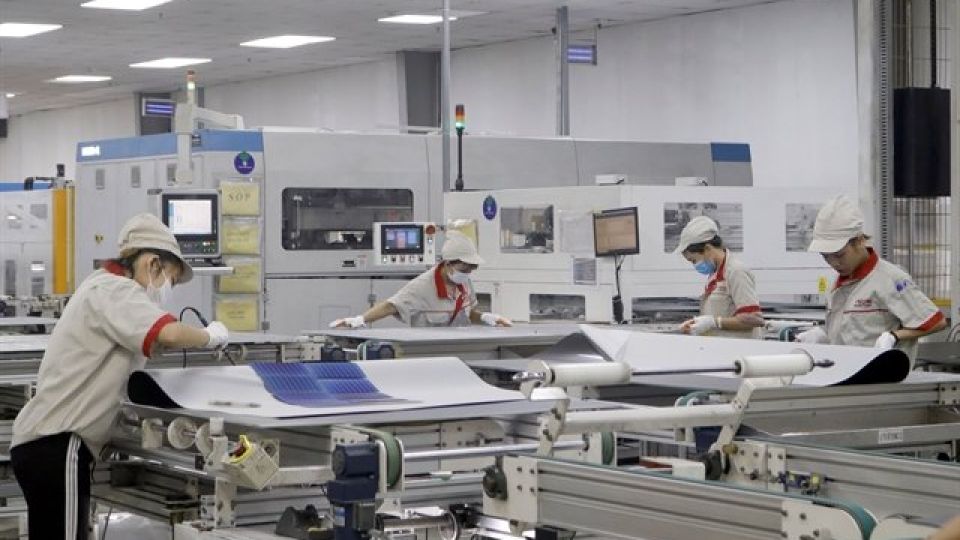February 17, 2023
HANOI — Việt Nam needs to speed up approving large-scale projects to support green growth activities, said Kazuo Kusakabe, chief representative of Toshiba Asia Pacific.
Kazuo made the statement at a Việt Nam-Japan research forum held by the Central Institute for Economic Management (CIEM) on Wednesday morning in Hà Nội.
He noted Việt Nam did not have much time to achieve its goal of net zero emissions by 2050 and should work towards a green economy while responding to climate change.
Director of CIEM Trần Thị Hồng Minh told participants that over the years, the world has experienced major trends in the geopolitical situation, the Fourth Industrial Revolution, digital transformation and climate change.
Participants said that to handle the challenges of climate change and work towards green growth after the pandemic, over the years, Việt Nam and other countries have recognised the need to promote international cooperation.
She said that Việt Nam was recognised as one of the world’s most vulnerable to climate change, therefore, it has been proactive in conducting many solutions to minimise its impacts. At COP26, Việt Nam had a strong ambition when it committed to net zero emissions by 2050.
In addition, commitments to sustainable development have also been included in new-generation free trade agreements (FTAs) such as the Comprehensive and Progressive Agreement for Trans-Pacific Partnership (CPTPP) and the EU-Vietnam Free Trade Agreement (EVFTA).
In order to handle the challenges of climate change, Việt Nam has worked with Japan in the field of green growth. This cooperation is crucial for Việt Nam.
It is said that Việt Nam achieved many important results in cooperation with Japan in terms of investment, import-export, sustainable infrastructure development, and human resource development.
Statistics from the Foreign Investment Agency of the Ministry of Planning and Investment showed that Japan has always been one of the biggest foreign investors in the country. The potential for cooperation in green growth between the two sides is quite large, when both countries are members of the CPTPP and the Indo-Pacific Economic Framework for Prosperity (IPEF) is under negotiation. Both CPTPP and IPEF have cooperative contents in terms of green growth.
Some key sectors with great cooperation potentials include electrical and electronic equipment, wooden architecture, wind, biomass, solar power, and organic aquaculture.
Speaking at the forum Nguyễn Anh Dương, head of the research unit of CIEM said Vietnamese stakeholders, especially small and medium businesses, expected opportunities for cooperation and technology transfer from Japanese partners, noting that Việt Nam needed to improve its service quality involving logistics, digital tech and labour skills.
Dr. Võ Trí Thành, director of the Institute for Brand and Competitiveness Strategy, told participants that to achieve the goal of net zero emissions by 2050, Việt Nam “cannot go alone” but needed to strengthen international cooperation, and outline solutions to mobilise capital domestically and internationally.
Also at the forum, participants focused on exchanging and analysing new domestic and international trends and development along with the driving forces behind green growth efforts in Việt Nam.
VN-Japan Economic Forum 2023
In another development, Deputy Prime Minister Trần Lưu Quang on the same day suggested Việt Nam and Japan strengthen their investment cooperation, especially in spearhead industries, pay attention to technology transfer, and promote green transition.
Speaking at the Việt Nam-Japan Economic Forum 2023 in Hà Nội, the Deputy PM affirmed that the Vietnamese Government will always accompany and create optimal conditions for Japanese firms to operate in the Southeast Asian nation for the long term.
The two countries should expand their trade collaboration, he said, stressing the need to effectively implement bilateral and multilateral cooperation mechanisms such as the Việt Nam-Japan Free Trade Agreement, the ASEAN-Japan Comprehensive Economic Partnership (AJCEP), the Comprehensive and Progressive Agreement for Trans-Pacific Partnership (CPTPP) and the Regional Comprehensive Economic Partnership (RCEP) in order to raise the bilateral trade revenue in a balanced manner.
Quang also suggested the two countries elevate their strategic partnership on digital platforms, thus opening up investment and connectivity opportunities for businesses.
He called on the Japanese side to share its experience and knowledge in digital transformation and business administration, and build research and development (R&D) centres in the country.
The forum was jointly held by the Vietnam Chamber of Commerce and Industry (VCCI) and the Japan Chamber of Commerce and Industry (JCCI) on the occasion of the working visit to Việt Nam by Chairman of the Japan-Mekong Business Cooperation Committee Yoshihisa Suzuki.
VCCI Chairman Phạm Tấn Công noted that Japan is among the three biggest foreign investors in Việt Nam with about 4,835 projects worth over $64 billion.
Two-way trade reached nearly $50 billion last year, making Japan the fourth largest trade partner of Việt Nam, he said, adding that with a vision set for the next 50 years, the two countries boast substantial potential to boost their economic cooperation.
Việt Nam expects to become a developed country by 2045, and to achieve the goal, the country needs to maintain its GDP growth constantly at 6-7 per cent annually, which would be a great opportunity for Japanese and Vietnamese enterprises to grow together.
Discussions within the forum focused on bilateral cooperation in high-tech agriculture, renewable energy, green growth and start-ups, according to Công. — VNS


